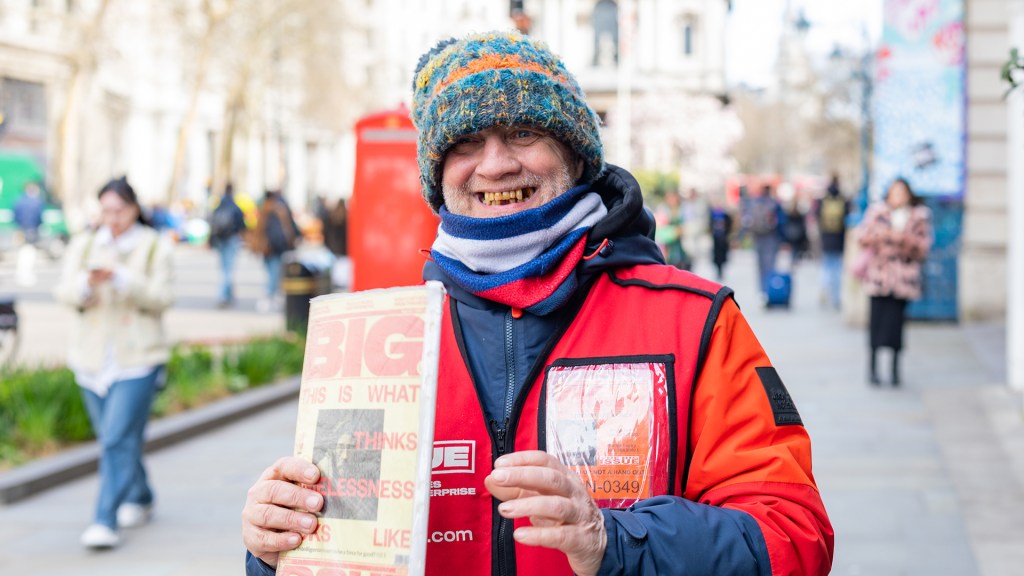Kelvin Gregory, Somerset House, London (Mon-Fri) Lordship Lane, Dulwich (Sat)
Kelvin has been with The Big Issue since we launched in 1991. When he's not selling the magazine he likes to go to gigs and raves
I’ve been selling The Big Issue since its inception back in 1991. I grew up a Thatcher teenager and became homeless when I was 16, living between bedsits, B&Bs and squats. I begged for a little bit and worked the squeegee buses, until one day I saw The Big Issue and thought, “I’ll have a bit of that.” Since then, I’ve sold up and down the country in Stirling, Glasgow, Cornwall, Nottingham (where I was also a hunt saboteur) and Manchester. I came back to London 17 years ago and settled in Clapham in South London with my partner, who I’ve been with for 14 years.
I’ve always treated The Big Issue as my own business. After Covid, I signed on to see if I was entitled to any additional benefits. I didn’t want much, just a bit to pay my tube fares each week, but when I declared my earnings with them they told me I’m not in gainful employment and I need to get “a better job with better pay and better hours”. So I told them to stuff it. I’ve built up a customer base on my pitch and I love seeing my regulars. The Big Issue gives me purpose and helped me take control of my life, and taught me valuable interpersonal, communication and budgeting skills. This is my job and I’m not changing it. We’re part of the community – Big Issue vendors are just as iconic as London buses, telephone boxes and black cabs.
Your support changes lives. Find out how you can help us help more people by signing up for a subscription
I want to break down the misconceptions of the Big Issue vendor. We’re not all drunk, on drugs or homeless. For some, it’s just the job that works best for them. Remember, we don’t get the magazines for free, and what we buy, we have to sell, and as the job is customer and weather driven, the sales and return aspect can be difficult some weeks. Thankfully, I’ve found people are generally quite open to it, and it’s usually those who have less that tend to give more, and so I want to say a big thank you to the public and to the Big Issue staff who have helped me out over the years.
One of the highlights was doing the sell-off with Melanie Sykes a couple of weeks ago. I showed her my selling technique, which is to just put yourself out there, be witty and even be a little cynical! Some of the best lines I use are: “Buy one, get me free”, “Buy two and read it in stereo”, or “Be different, say yes!” We stood in the rain and sold to some of my regulars, and we had a stimulating chat about mental health. I think people over the age of 40 have started to become more open about their mental health since Covid, which is important. I know my energy levels have dropped since the pandemic and I need to take more care of myself in the winter months, so I take the dog out for a walk at 5.30 every morning to get some fresh air, clear my head and wake me up ready for work. But I also think technology plays a big part in it. We’ve become too reliant on it, and it’s changing how people communicate with each other. If I have one message for everyone, it’s to embrace less technology. Be personable, create conversation and get off your phone folks!
Get the latest news and insight into how the Big Issue magazine is made by signing up for the Inside Big Issue newsletter
When I’m not working, I go to gigs and raves where I can. I grew up a punk, but then got into the rave scene as it started to emerge. I used to do the early Shambala festivals before they got too big and corporate. I’ve got Dub Pistols’ Mucky Weekender in September, which should be good. I know it can be a bit hedonistic, but what I like about Dub Pistols gigs or The Skints gigs is there’s never any angst. It’s just peace, community and fun.
If I had to sum up my life in three words, it would be: Kelvin for anarchy!
Interview: Lee Pillar
Somerset House, Strand, London, UK

